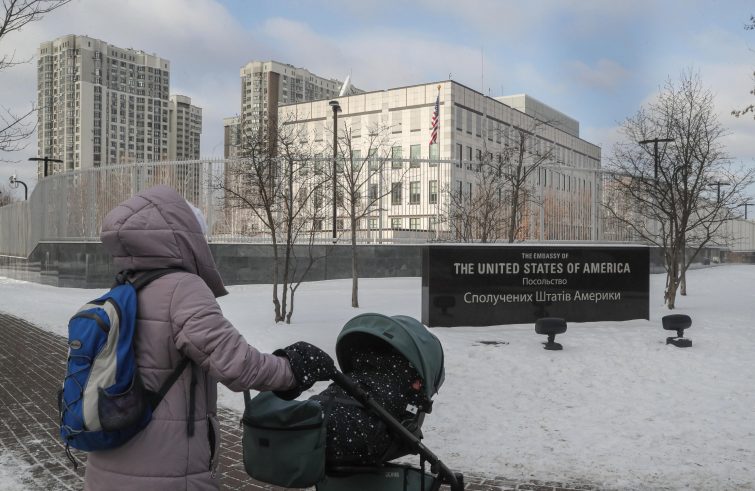
“I believe that in this situation raising the stakes, including military stakes, is the most dangerous response. Those countries sending weapons or soldiers to Ukraine or the Baltic countries, for example, are making a mistake, because those operations raise the scale of the conflict and in any case they will not change the course of events. What should be done in this situation is to resume talks with the aim of reaching a comprehensive solution to the problem of European security, which does not mean capitulating to Russia but talking to Russia.” In short, all military plans should be scrapped, “opting for the path of diplomacy at all times.” Aldo Ferrari, Professor at Ca’ Foscari University in Venice, Head of Research on Russia, Caucasus and Central Asia at ISPI (Italian Institute for International Political Studies) provides an overview of developments involving Ukraine, Russia, the United States and NATO. Tensions are high. NATO has enhanced its forward presence in eastern Europe. The Baltic nations have sent anti-tank and anti-aircraft missiles. The US State Department ordered the evacuation of diplomats’ families. EU High Representative for Foreign Affairs and Security Policy Joseph Borrell called for a de-escalation of tensions, but London, Berlin and Vienna have started evacuating.
Professor, are we really heading for a war in the heart of Europe?
In my personal opinion we are not heading towards an armed conflict. If that were the case, it would mean that Russia has acted in a politically reckless and irrational manner. Russian foreign policy has often been brutal, but it also had an underlying rationale. Russia has no interest in invading and occupying Ukraine for many reasons.
Ukraine is a large, densely populated country, with a high number of people hostile to Russia, and who would therefore be willing to fight and resist relentlessly. Even if Russia were to win this war, it would come at a very high cost.
Moreover, should a war break out with a Russian occupation in Ukraine, Russia’s problem – i.e. having NATO on its borders – would not be resolved. Thus this scenario would lack rationality
So why are both Russia, US and NATO seemingly preparing for an escalation?
As Westerners, we struggle to understand the Russian point of view. Western societies righty claim that an independent nation like Ukraine has the right to join all alliances, both military and political. However, I have a question: if Cuba wanted to join the Russian-led military alliance CSTO, deploying Russian missiles near the American shores, how would the United States react?
Clearly, for Russia, the presence of the world’s largest military alliance of all times at its borders constitutes an objective threat to its national security.
Why so much tension right now?
It’s not from now. For many years, Russia has been requesting Western governments to change their policy of expansion towards the East, and they have never given an answer. Russia has decided to flex its muscles and set a sort of ultimatum to the US and NATO, demanding written answers about security and in particular about NATO’s expansion to the East. But in doing so, Russia has taken a risky stance.
Why?
These requests are ultimately inadmissible because NATO and the United States will never comply.
This leaves us with two possible scenarios. The first is that in order not to lose face, Russia might be forced into something it doesn’t want, namely to initiate military intervention. The second scenario is that it will accept to embarrass itself, like a dog whose bark is worse than its bite. Given the heightened tensions, a compromise solution of some kind is the most likely possibility. However, Russia has already achieved two goals.
Which ones?
It forced the Western world to finally listen to its demands. The meetings that have taken place at close quarters, albeit unproductive, have, at least, signalled a resumption of negotiations. This is a step forward compared to the past years of silence or utter lack of communication. Some small – indeed very modest – results may be achieved in these negotiations.
For the past eight years, since 2014, Ukraine has been in the throes of a “hybrid” war that has never flared up. An insidious war that is bringing the country to its knees. Paradoxically, can a war resolve this stalemate?
Yes, it could. But it would be a bloodbath. It would be a horrible war.
Ukraine is a country with a population of 40 million, which has been preparing for this possibility for years and would fight back. There would be tens of thousands of casualties. Again, as I said before, I don’t expect a war to break out because there are no objective reasons or interests for this to happen. However, it should be remembered that many wars have erupted for irrational reasons. Just think of the First World War, when the whole of Europe was torn apart for nothing.
That’s why I believe it is unwise to deploy military troops and increase the tensions. It is important to dialogue with Moscow.










